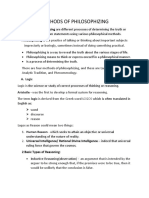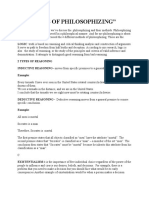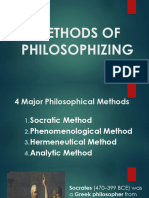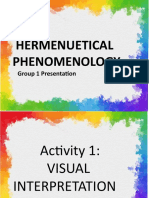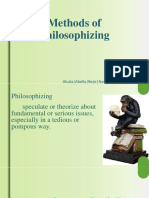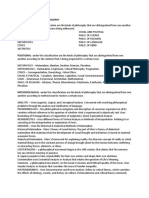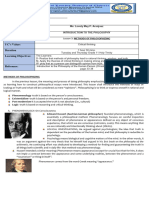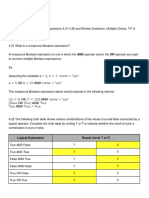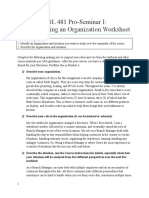0% found this document useful (0 votes)
23 views3 pagesPhilo Lesson 3
This document provides an overview of four major methods of philosophizing:
1. The dialectic method conceived by Socrates, using disciplined questioning to elicit contradictions and arrive at clear definitions.
2. The pragmatic method focused on determining the practical results and problem-solving ability of beliefs.
3. The phenomenological method developed by Edmund Husserl to bracket biases and focus on immediate experience through epoche.
4. Existentialism influenced by Kierkegaard and Nietzsche, reacting against system building and religious/rational value systems.
Uploaded by
shenieleybmonticod2006Copyright
© © All Rights Reserved
We take content rights seriously. If you suspect this is your content, claim it here.
Available Formats
Download as PDF, TXT or read online on Scribd
0% found this document useful (0 votes)
23 views3 pagesPhilo Lesson 3
This document provides an overview of four major methods of philosophizing:
1. The dialectic method conceived by Socrates, using disciplined questioning to elicit contradictions and arrive at clear definitions.
2. The pragmatic method focused on determining the practical results and problem-solving ability of beliefs.
3. The phenomenological method developed by Edmund Husserl to bracket biases and focus on immediate experience through epoche.
4. Existentialism influenced by Kierkegaard and Nietzsche, reacting against system building and religious/rational value systems.
Uploaded by
shenieleybmonticod2006Copyright
© © All Rights Reserved
We take content rights seriously. If you suspect this is your content, claim it here.
Available Formats
Download as PDF, TXT or read online on Scribd
/ 3




















